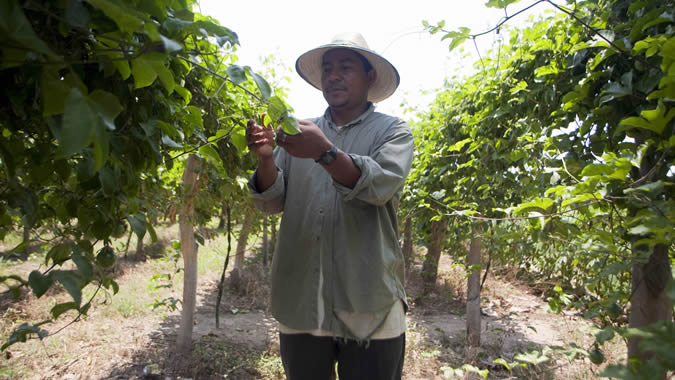Briefing note
Financial inclusion is a tool that boosts the creation of opportunities and strengthens the ability to achieve the Sustainable Development Goals (SDGs), the Economic Commission for Latin America and the Caribbean (ECLAC) indicates in two studies carried out by the organization’s Subregional Headquarters in Mexico.
In the first study, ECLAC underscores that El Salvador faces the challenge of institutionalizing a national strategy for financial inclusion, while in the second, it stresses that Honduras must seek to strengthen its National Financial Inclusion Strategy (NFIS), adopted by that country’s government in 2015.
In the document Financial Inclusion of Small Rural Producers: Case Study in El Salvador (in Spanish), the United Nations regional commission indicates that El Salvador has the opportunity to improve the well-being of its people, especially those living in rural areas, through greater access to and use of financial services, taking advantage of the development of new technological platforms.
This publication by the Economic Development Unit of ECLAC’s Subregional Headquarters in Mexico indicates that with the creation of a National Financial Inclusion Council (NFIC) in El Salvador, officials could tackle three strategic challenges, strengthening: i) the coordination between public and private entities; ii) the flow of information among those who supply and demand services; and iii) the regulatory framework.
The study also shows and systematizes the different efforts made in El Salvador in recent years to promote financial inclusion and, based on these, it proposes a national strategy, taking advantage of the valuable institutional experience garnered in countries such as Colombia, Mexico and Peru, among others.
According to the Central Reserve Bank of El Salvador, the population’s access to financial accounts was 47% in 2016, which is higher than the rate obtained in a World Bank survey (36.7% in 2014). However, a key aspect worth noting is that rural accounts in financial institutions accounted for 28.1% in 2014, 13 percentage points below the presence of urban accounts.
Finally, the report indicates that the Financial Inclusion Law approved in 2015 boosts the opportunities for expanding financial services through cellular telephones (electronic wallet) and facilitates access to more segments at a lower cost. However, a pending challenge is to achieve inter-operational compatibility among mobile telephone networks and the banking industry, enabling the creation of an ecosystem of transactions that facilitates greater inclusion.
Meanwhile, in the Case Study on Strategies to Promote the Financial Inclusion of Small Rural Producers in Honduras (in Spanish), ECLAC sets forth the main findings regarding the recent evolution, current situation and future prospects of the financial inclusion of small Honduran rural producers.
The report recognizes the effort involved in developing the National Financial Inclusion Strategy (NFIS) in Honduras, which is based on an assessment that describes the main causes of financial exclusion in the country and uses this to establish strategic goals by identifying excluded segments of the population, intervention mechanisms, relevant actors, as well as mechanisms for monitoring and oversight.
According to the report, financial exclusion in Honduras is a phenomenon concentrated mainly in rural areas. This is confirmed upon observing the presence of different types of entities, in which banks have 79% of coverage in municipalities of more than 50,000 inhabitants, financial firms are concentrated in cities of more than 50,000 inhabitants, and Private Development Organizations dedicated to financial activities have located themselves more in municipalities of between 20,000 and 50,000 inhabitants.
According to the publication, in Honduras there are two innovative distribution channels – correspondent agents and the electronic wallet – that have the potential to expand the financial system’s coverage and could help make the small operations sought by inhabitants of less-dense areas profitable by reducing the distribution and transaction costs associated with them.
Both publications are part of the project “Inclusive Growth, Rural Industrial Policy and Strengthening Value Chains in Latin America and the Caribbean”, through which ECLAC’s Subregional Headquarters in Mexico seeks to strengthen the analysis and formulation of public policies that foment financial services and increase the sustainable access of small rural producers in the region.



